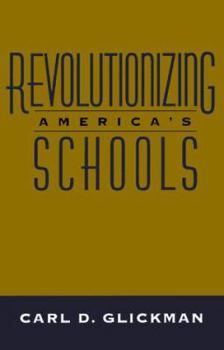Revolutionizing America's Schools (Jossey Bass Education Series)
Revolutionizing America's Schools is provocative, personal, and right on the mark. It should be read by anyone who believes our schools can better educate our young and who is committed to making the effort to improve them. -- Paul Schwarz, Principal of the Jackie Robinson Complex, and Co-director of Central Park East Secondary School, East Harlem, New York City With this insightful, practical collection of personal essays, Glickman tackles education's most urgent questions. Who should govern schools? Whose values should schools represent? How should teachers teach? How does democratic change occur? Glickman directly addresses issues of race, culture, gAnder, and religion and reveals how understanding these issues can contribute to purposeful change, and he connects democratic rhetoric to action -- covering such practicalities as student grouping, curriculum selection, and school leadership. Introduction: A Vision of Democracy Part One: On Democracy 1. Democracy -- What Is It? 2. Democracy and Education 3. Ambiguity and Informed Minds Part Two: On Pedagogy 4. Powerful Learning 5. School Structures for Teaching 6. Teacher Education and Public Schools 7. Governing for the Future Part Three: On Getting Beyond 8. Wealth and Welfare 9. Isms and Reasons 10. Religion, Secular Humanism, and Geese 11. Who Owns the Child? 12. Constitutional Hope for Education Part Four: On Differences 13. Race and Education 14. Suffrage, GAnder, and Listening 15. From Our Ancestors Part Five: On Change 16. Finding Room for School Change 17. Listening to Students 18. Leadership for Democracy Conclusion: Democracy as Education
Format:Hardcover
Language:English
ISBN:0787909440
ISBN13:9780787909444
Release Date:August 1997
Publisher:Jossey-Bass
Length:224 Pages
Weight:0.40 lbs.
Dimensions:0.8" x 6.0" x 9.3"
Customer Reviews
1 rating
A revitalizing way to look at democracy as education
Published by Thriftbooks.com User , 26 years ago
Three important points this book makes:Reclaim a Democratic Vision: Our forefathers founded this country on democratic principles which seemed to have gotten lost in the mist. Yet, in order to regain the vision, education must look back to these principles and revolutionize its pedagogy in the same manner as Jefferson, Hamilton, Franklin, et al. did for their countrymen. Education as democracy results from "decisions guided by justice and equality for all in striving for life, liberty, and the pursuit of happiness." (p. 180). Democratic Schools Do Better: Practicing democracy in teaching leads to a better foundation for students. This is evidenced in many studies (Aiken's 'eight-year study', Newmann's research on "active learning" developed in schools making democratic efforts, Sharan's work which reveals that democratic-process teaching creates twice the learning as passive lecture, etc.). Democracy is the overriding, unifying principle; all else is secondary: It is the foundation for change. It is both the means and the end. "It is a means insofar as equality, liberty,and fraternity are used to make decisions; it is an end when changes achieve greater equality, liberty, and fraternity in the learning experiences of all the students in a classroom, school, or community" (p. 167-168). Democracy becomes the overriding purpose behind education and the practice of democracy will be the thrust behind change in our schools and communities.Revolutionizing America's Schools urges us to revolt yet one more time. Today's heresy is actually yesterdays' revolution. The wheel has come full circle.Sandie Miller, Pepperdine Educational Technology Doctoral Student






